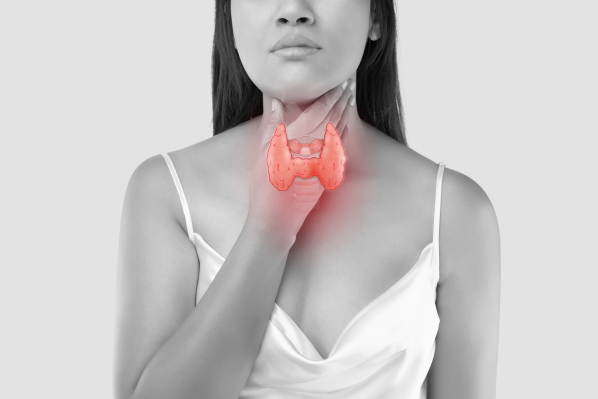Hyperthyroidism, Overactive thyroid, Grave's Disease
Description : Hyperthyroidism is a condition in which your thyroid gland produces an excessive amount of thyroid
Article Details :
What is Hyperthyroidism?
Hyperthyroidism is a condition in which your thyroid gland produces an excessive amount of thyroid hormone. The thyroid is a butterfly shaped gland which is located below your voice box and above your collarbones. Its function is to produce the following hormones: triiodothyronine (T3) and thyroxine (T4). These hormones play an important role in regulating the use and storage of energy in your body. This secretion is regulated by a gland found in your brain known as the pituitary gland. The latter produces thyroid-stimulating hormone (TSH) that will act on the thyroid depending on the body’s demand, to produce T3 and T4.
In hyperthyroidism, there is an excessive amount of T3 and T4 which leads to an increase in the body’s metabolism. There are different forms of hyperthyroidism including diffuse toxic goitre (Graves’ disease), toxic multinodular goitre (Plummer disease) and toxic adenoma. Graves’ disease is the most common form in the United States accounting for about 60-80% of cases. Hyperthyroidism is more common in women compared to men.
The treatment for hyperthyroidism include the following: symptom alleviation, antithyroid medications, radioactive iodine or thyroidectomy.
Causes of hyperthyroidism
There are several causes of hyperthyroidism. These include:
- Graves’ disease: This is the most common cause of hyperthyroidism. However, the exact mechanism through which it arises is not clearly known. In Graves’ disease, you own immune system produces an antibody which acts on your thyroid gland. In doing so, it stimulates your gland to produce excessive amounts of thyroid hormone. It is most common among women aged between 20-40 years. The thyroid gland appears enlarged (goitre). In some people, the disease can also affect the eyes making them irritated and swollen. It can also progress to loss of vision.
- Thyroid nodule: The presence of one or several growths or lumps (nodules) on your thyroid gland can increase the production of thyroid hormones. This is also known as a toxic nodule or toxic nodular goitre (if more than one is present).
- Thyroiditis: This is when your thyroid gland becomes inflamed. This triggers the excessive production of thyroid hormones into your blood circulation. Examples include: painless thyroiditis and postpartum thyroiditis.
- Subacute thyroiditis: This arises when your thyroid becomes inflamed due to a virus. It makes the thyroid gland bigger and painful. Once the viral infection subsides, the hyperthyroidism will also disappear.
- Excessive intake of thyroid hormone: Hypothyroidism is the opposite of hyperthyroidism, that is, not enough thyroid hormone is being produced by your gland. In this case, thyroid hormone medications are prescribed to compensate for it. If an individual on thyroid hormone medication takes too much of the drug, hyperthyroidism may ensue.
It is also known that you are more at risk of having the condition if you have close family members with hyperthyroidism.
Signs and symptoms of hyperthyroidism
If you have hyperthyroidism, you may experience the following symptoms:
- Sleeping difficulties
- Anxiety
- Irritable mood
- Weakness especially in your upper arms and thighs
- Difficulty to lift heavy objects or getting up from a chair
- Increased sweating
- Heat intolerance
- Palpitations
- Irregular heartbeats
- Fatigue and lethargy
- Loss of weight
- Increased frequency of bowel movements
- Irregular menses
- Infertility
- Erectile dysfunction
- Protruding or swollen eyes
- Double vision
- Reddening and thickening of skin most commonly on the shins
Making a diagnosis
To make the diagnosis of hyperthyroidism, your doctor will begin by taking a thorough history from you. He/she will then examine you from head to toe, focusing on your neck where the thyroid gland is present.
Other tests may be requested in order to confirm the diagnosis and also help in the treatment choice. These tests include:
- Thyroid function test: Samples of blood may be taken to check for the levels of TSH, T3 and T4. In hyperthyroidism, TSH level is usually low while the levels of T3 and T4 are high. These blood tests are the most reliable methods of assessing thyroid function. However, other factors should be taken into consideration when interpreting the results as the latter can be disturbed certain circumstances such as pregnancy.
- Autoantibody test: This is a test performed to check if your immune system is producing antibodies causing inflammation of your thyroid gland. This is usually present in Grave’s disease.
- Scintigraphy: In this procedure, a substance known as a radioactive isotope is injected in your blood. A special apparatus is then used to visualize how iodine is collected in your thyroid.
- Thyroid ultrasound: Sounds waves can be used to visualize your thyroid using a probe connected to a screen. This can help in identifying the presence of nodules on your thyroid.





